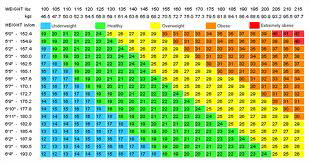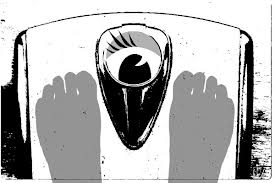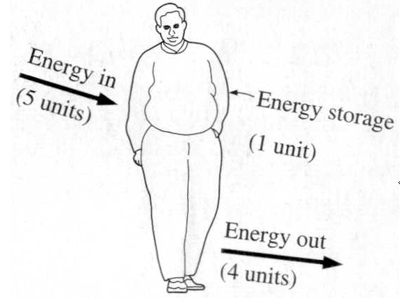Percentages of Seriously Obese women with above-normal BMIs
- POSTED ON: Apr 24, 2014
 Yesterday I answered a question from a member of a forum that I frequent. I'm doing that again today.
Yesterday I answered a question from a member of a forum that I frequent. I'm doing that again today.
Forum Member Asked: ![]()
"What percentage would you say .. of those with above-normal BMI's are seriously obese? I'm pretty sure the morbidly obese comprise under 10%, but would you include others in the seriously obese category?"
![]() I found this an interesting question. I thought about it; did some research; made some rough calculations; and came up with the following answer.
I found this an interesting question. I thought about it; did some research; made some rough calculations; and came up with the following answer.
There are "official" stages of obesity, using the BMI.
Stage 1 is 30 - 34.9 BMI -- obesity
Stage 2 is 35 - 39.9 BMI -- severe obesity
Stage 3 is 40 - 49.0 BMI - morbid obesity
Stage 4 is 50 and up BMI - super obesity
Personally, I would include most of the Stage 2, severe obesity people into what I term the "seriously obese category", depending on the number of years they've spent above Stage 1.
Weight Loss Expectations
- POSTED ON: Apr 12, 2014

![]()
Here's some interesting information.
Managing Weight Loss Expectations
by Dr. Arya Sharma, M.D. Dr. Sharma's Obesity Notes
While there are almost no limits to short-term weight loss goals (anyone can starve themselves thin) – the reality of long-term weight loss is rather sobering.
While diet and exercise generally provide an average long-term (3-5 years) sustainable weight loss of about 3-5% of initial weight, even bariatric surgery patients tend on average to sustain a weight loss of only 20-30% of their initial weight.
Surgery, although much safer than generally thought, still bears a risk of complications and the question is how much risk patients are willing to assume if they really knew and understood how much weight they are likely to lose with surgery.
This was the subject of a study by Christina Wee and colleagues, published in JAMA Surgery, in which they examined weight loss expectations and willingness to accept risk among patients seeking bariatric surgery.
The researchers interviewed 650 patients interested in bariatric surgery at two bariatric centres in Boston.
On average, patients expected to lose as much as 38% of their weight after surgery and expressed disappointment if they did not lose at least 26%.
In fact, 40% of patients were unwilling to undergo a treatment that would result in only 20% weight loss.
Most patients (85%) accepted some risk of dying to undergo surgery, but the median acceptable risk was only 0.1%.
On the other hand, some patients (20%) appeared more desperate, willing to accept a risk of 10% or greater.
As one may expect, there were important gender differences in these findings: while women were more likely than men to be disappointed with a 20% weight loss, they were also less likely to accept a greater mortality risk.
An important finding for clinicians was that patients with lower quality-of-life scores and those who perceived needing to lose more than 10% and 20% of weight to achieve “any” health benefits were more likely to have unrealistic weight loss expectations.
This study not only shows that most patients seeking bariatric surgery have rather unrealistic weight loss expectations but also that a substantial number may well be be disappointed with their weight loss after surgery.
It is also evident that many patients believe that they need to lose a rather s...
How Fast...How Much...Weight Lost After Gastric Bypass?
- POSTED ON: Apr 06, 2014

22 years ago at age 47, weighing 271 lbs. at a height of 5'0", I had an RNY gastric bypass, open surgery, with NO removal of any intestine, which means that every calorie I eat is still digested, and still counts.
The doctor's recommendation for post-surgery eating was simple. "Eat three meals a day of whatever food you want, but make half of each meal protein; avoid fried foods and sweets; and have no carbonated beverages."
My surgery was done when the procedure was still considered experimental. At the time, it was performed here in California by only a few doctors. To get surgery, people had to travel to San Diego, stay in the hospital 2 or 3 days, then stay at a local hotel for an additional 10 post-surgery days before being released to return back home. Follow-up care was received once a month during the surgeon's visit to one of the nearby temporary clinics located in various cities throughout California. About five years later, surgeons all over California began setting up specialized practices for weight-loss surgery, and coordinated with nutritionists who made specific post-surgery diet recommendations like protein shakes etc. That happened several years before laser surgery became common.
The first year after surgery my body would tolerate very little food. Eating more than one-quarter to one-half cup of food at a time made me feel uncomfortably stuffed like after Thanksgiving dinner.
I frequently experienced Dumping syndrome, which is caused by food passing too quickly into the small intestine. This caused immediate symptoms of flushing, weakness, fatigue, dizziness, and an intense desire to lie down. Severe episodes include feelings of nausea, and even stomach cramps.
I experienced severe dumping symptoms after just a swallow or two of fruit juice; or one or two bites of fried-or-greasy food; or a bite or two of any sweet like cookies, cake, pie, candy. I also became lactose intolerant. Milk made me feel ill, and even the tiniest bit of ice cream, with it's combination of milk and sugar, immediately made me lie-down-with-dry-heaves-ill.
Therefore, due to my weight-loss surgery, that entire first year my food intake was somewhere between 200 to 600 calories a day, which caused my weight to drop from 271 down to 161 lbs .... without dieting. This happened while I ate however much I could, of whatever food my body would tolerate. The reason I did not binge, cheat, or quit, even when my weight-loss was slower than I believed I deserved, was because it was physically impossible for me to do so.
Most people think that weight loss after WLS always happens rapidly. That immense amounts of weight fall off everyone's body every week, 5-10-15 pounds, week-after-week, like on the Biggest Loser tv show.. only maybe even faster.
However, Real Life AFTER a Gastric Bypass Surgery, works just like Real Life BEFORE a Gastric Bypass Surgery. Even though after a RNY surgery Everyone has a smaller stomach, and Everyone eats just a small amount, the rate of weight-loss continues to be an individual matter. Some people's bodies simply drop weight faster than other people's bodies, and surgery doesn't change that fact.
Below is a graph of my own individual weight-loss results. This is what happened to MY body during the 64 weeks after a RNY gastric bypass surgery. ...
Energy In and Energy Out
- POSTED ON: Mar 02, 2014

Much of the weight-loss and maintenance information available to us is both inaccurate and unhelpful. Like Dorothy of Oz and Alice of Wonderland, during my lifetime of research on those issues, I've seen some "weird shit".
Here in my DietHobby online scrapbook I work to sort out and save reasonably accurate information that might prove helpful to me and perhaps to others.
The article below deals with the issue of Energy In and Energy Out, which is not as simple as most people believe.
People have different body weights because each of them has an individual physiology and psychology which ultimately determines their own individual levels of "energy in" and "energy out" AND which also determines how their own individual bodies respond to it.
A snapshot of the unaveraged data contained in scientific research of Individual BMR or RMR (metabolism rates) bears a strong resemblance to a blood spatter pattern at a violent crime scene. Metabolism rates are all over the place, but these widely varying numbers are then averaged out to create the calculations we see formulas like Harris-Benedict, Mifflin, etc. An Average is a Statistical number for mathematical convenience. It is not an accurate number for Everyone, and sometimes is not even accurate for Anyone ... similar to the following joke:
A biologist, a chemist, and a statistician are out hunting. The biologist shoots at a deer and misses fifteen feet to the left, the chemist takes a shot and misses fifteen feet to the right, and the statistician yells "We got 'em!"
People the same sex, age, and size can take in the same amount of "energy" and do their best to engage in the same amount of activity, but wind up with very different weight results.
In tightly controlled feeding studies, the same absolute amount of extra calories can result in very different amounts of weight gain. Also, the exact same amount of caloric deficit will result in widely different amounts of weight loss.
In general, this basic fact of human nature is overlooked, or ignored.
Here is a recent article by obesity specialist, Dr. Sharma addressing this problem.

Why The Energy Balance Equation ...
Overruling the Body
- POSTED ON: Jan 24, 2014
 My observation is that the fat people who become "normal" size and maintain that size for more than just a few years, manage to do this through doing the hard work it takes to continually and consistently oppose the natural physiological desires of their "reduced obese" bodies.
My observation is that the fat people who become "normal" size and maintain that size for more than just a few years, manage to do this through doing the hard work it takes to continually and consistently oppose the natural physiological desires of their "reduced obese" bodies.
Rather than allow their bodies to tell them how to eat, they use their minds to overrule those bodies and consciously choose to eat food containing far less calories than their individual body desires. Forever … one-day-at-a-time.
It is possible, but it isn't easy.
See Running Down the Up Escalator.
First, let me clarify that my definition of a "fat" or "obese" or "reduced obese" person is not someone who merely hangs somewhere around their BMI Obesity border. Meeting that criteria requires a person to put in more than two or three years at a weight of … at least …. 20 to 50 pounds above their BMI Obesity border. To me, those who fail to meet that requirement are merely "overweight", a condition that is often temporary for them. Although many of these people term themselves as "fat" or previously obese, in general, they appear to have a very limited understanding of true obesity or the fat condition.
An overweight person tends to think that because they went on their first diet and easily lost and kept off 10 or 20 lbs, then an obese person, on their 50th diet can do the same thing for a longer time and lose and keep off 100+ lbs. This attitude is easily seen within the numerous online diet forums that are full of overweight or formerly overweight people who are eager to offer copious advice and personal judgments along these lines to people who are obese or reduced obese.
 This unequal comparison … apples to oranges … often confuses people who are truly obese or "reduced" obese and frequently results in negative self-judgments which are just wrong.
This unequal comparison … apples to oranges … often confuses people who are truly obese or "reduced" obese and frequently results in negative self-judgments which are just wrong.
So, applying this clarification, There are psychological desires (of the mind), and physiological desires (of the body). What does it take to continually and consistently use one's mind to oppose the natural physiological desires of one's body? Is the ongoing difficulty of opposing those desires worth the effort that it takes to be "normal" weight?
This is a Judgment call that depends ![]()
on the severity of the individual's mental pain which is caused by the culture's fat-bias, and the severity of the individual's physical pain which is caused by denying to one's own obese, or reduced obese body, the food substances which that body believes it needs for survival.
We must each decide this for ourselves. Thus far, for me personally, the balance tilts toward accepting the physical pain to avoid the mental pain. However, my personal dieting ...
<< Newest Blogs << Previous Page | Page 6 | Page 7 | Page 8 | Page 9 | Page 10 | Next Page >> Oldest >>







